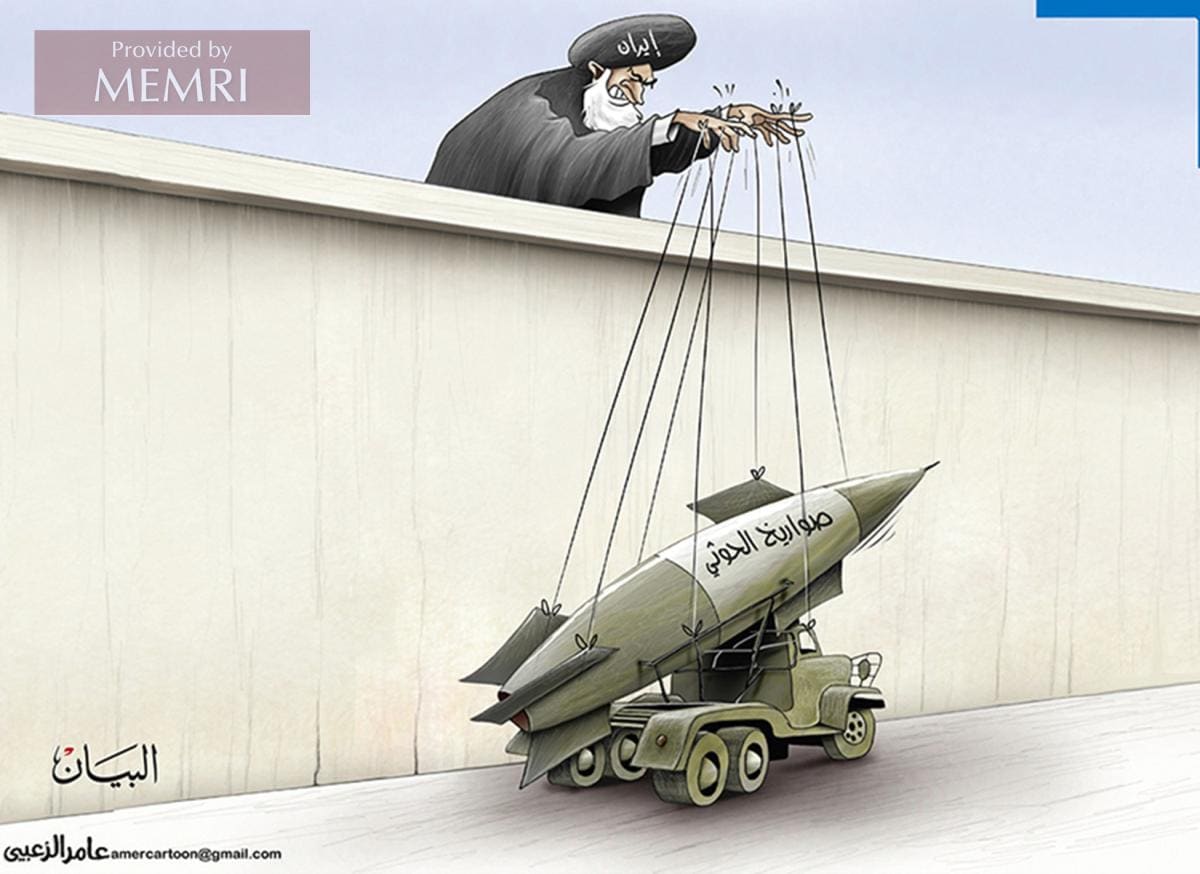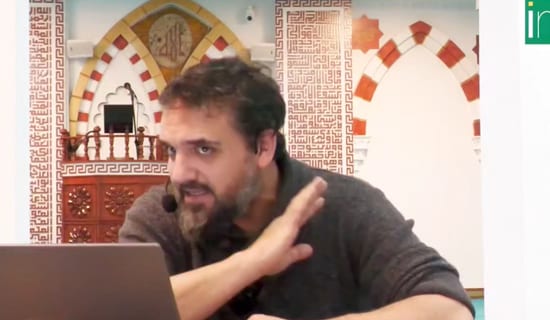In an article titled "The School of the Greatest Treason" in the Saudi daily Al-Watan, journalist Khalid Al-'Owijan condemns the global silence in the face of the terrorist Iran-backed militias that are deployed throughout the Middle East, such as Hizbullah in Lebanon, the Shi'ite militias in Iraq, Hamas in Gaza and the Houthis in Yemen, militias that betray their countries and destabilize them and the region as a whole. He states that the West in general and the Security Council in particular employ a double standard in addressing criminals of this sort: they take a firm stance against whoever threatens Western interests, but keep silent when Iran-backed militias threaten the Arab region. This silence, he says, only strengthens these militias and turns them into role models for other forces that purport to be political but are actually terrorist, forces that will eventually grow powerful and target the West.

Cartoon in Emirati daily: "Iran" operating the "Houthi missiles" (Source: Al-Bayan, UAE, March 28, 2018)
The following are translated excerpts from his article:[1]
"When a traitor becomes complacent and flaunts his treason openly, he perceives this as the pinnacle of courage. But the truth is different, because this courage likely stems from the minimal cost paid by the one who has hired him and uses him to carry out his orders, realize his agenda, etc. Many know the truth about [this traitor], and examples of people who perform this sick role in the Arab world are unfortunately numerous.
SUPPORT OUR WORK

"From Lebanon to Yemen, through Baghdad and Gaza, [these traitors] have become a false symbol for some wretched people in the circles of Arab opinion-shapers… Such a [traitor is Nasrallah] in Lebanon, who opposes the policy of his country and opposes everything – from the formation of governments to heeding the will of the people… and even fights the independence of the judicial system, but at the same time supports the aspirations of the Syrian leader [Assad], who rules by the force of arms… This is also the conduct of the one who tore Gaza apart and missed many opportunities [to advance] the Palestinian cause because his movement, Hamas, adopted perceptions that range from those of Muslim Brotherhood to those of the [Iranian] Jurisprudent. And it is also the conduct of the Yemeni caveman [i.e., the leader of the Houthi movement, 'Abd Al-Malik Al-Houthi], who staged an armed coup against the government using weapons that came from outside [his country, i.e., from Iran], and dared to attack the noble [city of] Mecca while defying over one billion Muslims and disregarding their feelings, so as to realize the goals of those who grant him a paltry amount of political capital, reflecting his small worth.
"The existence of such people requires a correct reading of the arena. How? By realizing… that international law is based on factors of [political] climate and on a lack of rigor, on division and injustice, and on a failure to place all the world's criminals in the same basket [in terms of] international judgement and the scales of human justice. Proof of this climate is that some bitter wars broke out largely based on political fraud, like the war on Iraq, which some call 'the American occupation,' or the fact that multinational forces, led by the U.S., entered Afghanistan and caused a war that lasted over two decades, which many regard as 'an invasion, pure and simple'…
"Imagine [what would have happened] if the terrorist Hizbullah militia had [taken] the 100,000 troops that Nasrallah claims are under his organization's orders, as well as his 5,000 missiles, and deployed them on the borders of the U.S. [Imagine what would have happened] if Allah had decreed that Iraq's former president, the terrorist Nouri Al-Maliki, should be the leader of a pack of extremists hiding on the borders of France, or if fate had decreed that Houthi leader 'Abd Al-Malik Al-Houthi should be an influential German and placed him, by democratic means, in the ancient seat of Angela Merkel, or if an extremist militia like the Iraqi Popular Mobilization Units or the Gazan Hamas movement had been present in the vicinity of Great Britain. What would the scales of justice have shown in that case? And what would the international community have done?
"The situation in the world is no doubt twisted, and this includes the Security Council, which clearly employs a double standard in dealing with issues of the Arab world, due to the dictates of racist elements, or perhaps [simply] out of political stupidity. [The Security Council] has become an organization waiting for stable countries to pay it their annual taxes, while other, unstable countries are slow to do so, and there are indications that the repeated silence [of the Security Council], which failed to condemn the Houthi attacks on Saudi Arabia, stems from political selectiveness…
"Facts clearly show that many of those mercenary traitors have benefitted greatly from the international silence. How else can [we explain the fact that] a criminal like Nasrallah has increased his involvement in despicable religious and sectarian regional wars, such as the Syria war… or his support of the terrorist Iraqi Shi'ite militias, of the Houthis in Yemen, and of the terrorist Hamas in Gaza, which is occupied [by Hamas] and not by Israel? [Nasrallah's] rebellious conduct continues with this intensity [because] the [international] silence is taken to indicate that the world is pleased with the policy of [Nasrallah's] sectarian organization. This prompts this militia to behave like a state in Lebanon and outside it, to speak shrilly and to freely voice its opinion take a political position on global affairs...
"The failure to take measures against the militias and their treasonous commanders and projects – especially against the Hizbullah project, which is based on terror and on drug trafficking – has turned them into models for emulation and blazed a path for other entities, which may assume a political guise but are actually terrorist [entities] whose harm will transcend [the boundaries of] the region and reach the entire world.
"Hizbullah's occasional attempts to smuggle drugs [into the region] attest to the destructive nature of its project… on the internal level. The global political fiasco is that it has been allowed to operate even outside its virtual boundaries…"
[1] Al-Watan (Saudi Arabia), October 27, 2021.




